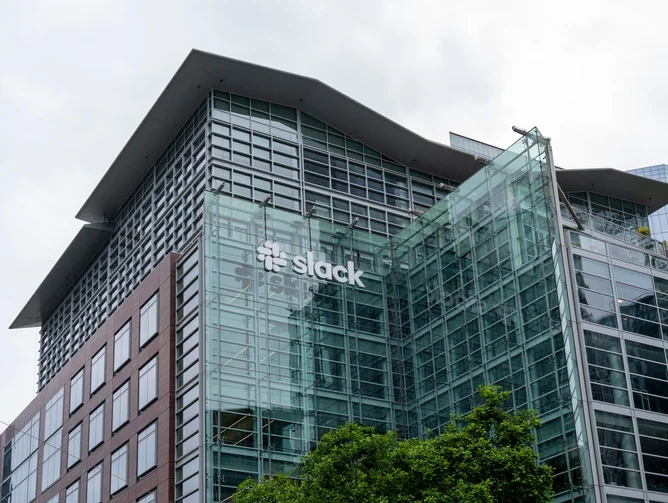Slack reveals global hesitancy and mistrust in embracing AI tools in the workplace, highlighting the need for AI guidance & training across industries.
AI has become one the hottest topics across the world, as it revolutionises workplaces by boosting productivity and sparking innovation across industries.
It’s no surprise that business leaders are vying to invest in AI technologies, integrate them into daily operations and maintain competitive edge in their respective industries.
However, there is an elephant in the room that is becoming clearer as AI continues to accelerate.
Recent research has uncovered that while the benefits of AI are widely recognised, getting workers to actually use these tools is proving to be a challenge worldwide.
According to a study by Salesforce’s Slack, a business communication platform owned by Salesforce, nearly half of global desk workers are uncomfortable telling their managers they’ve used AI for everyday tasks.
It seems that this issue is increasing as AI continues to infiltrate further into all workplaces, with many employees feeling uncertain about AI’s role in their jobs.
This hesitancy is creating a speed bump on the road to AI integration, causing ripples throughout the tech industry.
Employees conceal AI usage due to workplace concerns
The Slack Workforce Index, which surveyed over 17,000 workers across 15 markets, reveals a deceleration in AI adoption among desk workers worldwide.
According to Slack, this reluctance stems from various concerns, including the perception that using AI might be seen as cheating, fears of appearing less competent or worries about being labelled as lazy.
The study also indicates that this discomfort is contributing to a slowdown in AI adoption rates.
“The arrival of AI agents – with clearly defined roles and guidelines – will also help with adoption, alleviating the ambiguity and anxiety many workers feel around using AI at work”. – Senior Vice President of Research and Analytics at Slack, Christina Janzer.
In the US, for instance, worker AI adoption rates have only increased from 32% to 33% over the past three months, a stark contrast to the 8% point increase observed a year ago.
Yet Slack says that workers who are comfortable sharing AI use with their manager are 67% more likely to have used it for work.
Christina Janzer, Senior Vice President of Research and Analytics at Slack, says: “Too much of the burden today has been put on workers to figure out AI. It’s important that leaders not only train workers to use AI, but encourage employees to talk about it and experiment with AI out in the open”.
Misalignment between executive priorities and employee expectations
Slack also says that there is a disconnect between what leadership wants employees to focus on and how workers anticipate using the time saved by AI.
While executives prioritise learning, skill-building and innovation, employees expect to use AI-generated time savings primarily for administrative tasks and existing projects.
This misalignment highlights the need for clearer communication and guidance from leadership on the strategic implementation of AI in the workplace.
KEY FACTS:
- US AI adoption rates stalled at 33% over the past three months
- 48% of global desk workers feel uncomfortable admitting AI use to their managers
- 76% of workers feel urgency to become AI experts, yet 61% have spent less than five hours learning to use AI
- Workers who received AI guidance saw a 13% increase in adoption, compared to only 2% for those without guidance
- 3 out of 4 workers consider a company’s AI capabilities as a factor in their job search
Proving this theory, Slack found that workers who received guidance on AI usage saw a 13% point increase in adoption since January, compared to a mere 2% point increase for those without guidance.
Despite the current hesitancy, the potential impact of AI on business performance remains significant.
McKinsey research suggests that AI could increase corporate profits by US$4.4tn annually. Additionally, Salesforce data indicates that sales teams using AI are 1.3 times more likely to see revenue increases compared to those not utilising the technology.
The impact of AI-savvy expectation
Regardless of widespread uncertainty about AI in the workplace, there’s a growing urgency among workers to become AI experts.
In the UK for instance, 72% of workers express this desire, yet a staggering 65% have spent less than five hours learning to use AI.
This skills gap presents a critical challenge for employers not just in the tech industry, but across the world.
Globally, three out of four workers consider a company’s AI capabilities as a factor in their job search.
This trend is even more pronounced among new entrants to the job market, who are 1.8 times more likely to prioritise AI enablement in their career decisions.
Crucially, the study reveals that proper guidance significantly boosts AI adoption.
This may involve developing comprehensive training programmes, establishing clear guidelines for AI usage and fostering a culture of openness and experimentation with AI tools.
Christina concludes: “The arrival of AI agents – with clearly defined roles and guidelines – will also help with adoption, alleviating the ambiguity and anxiety many workers feel around using AI at work”.



